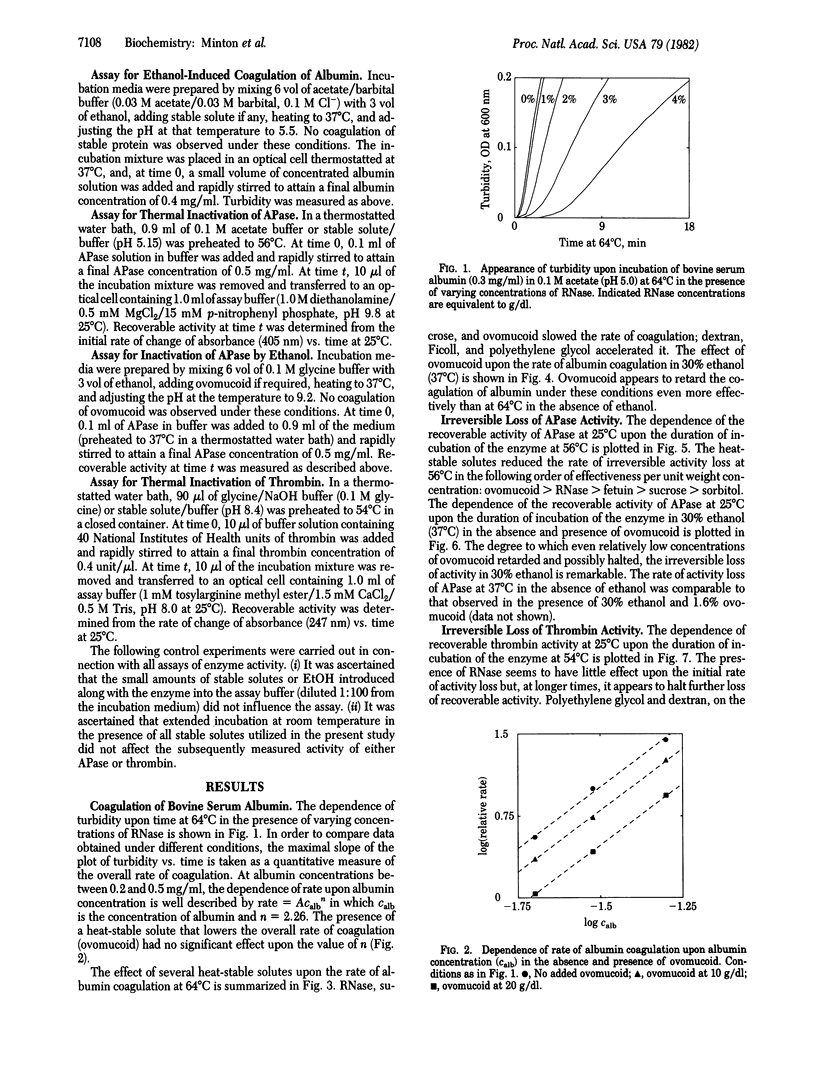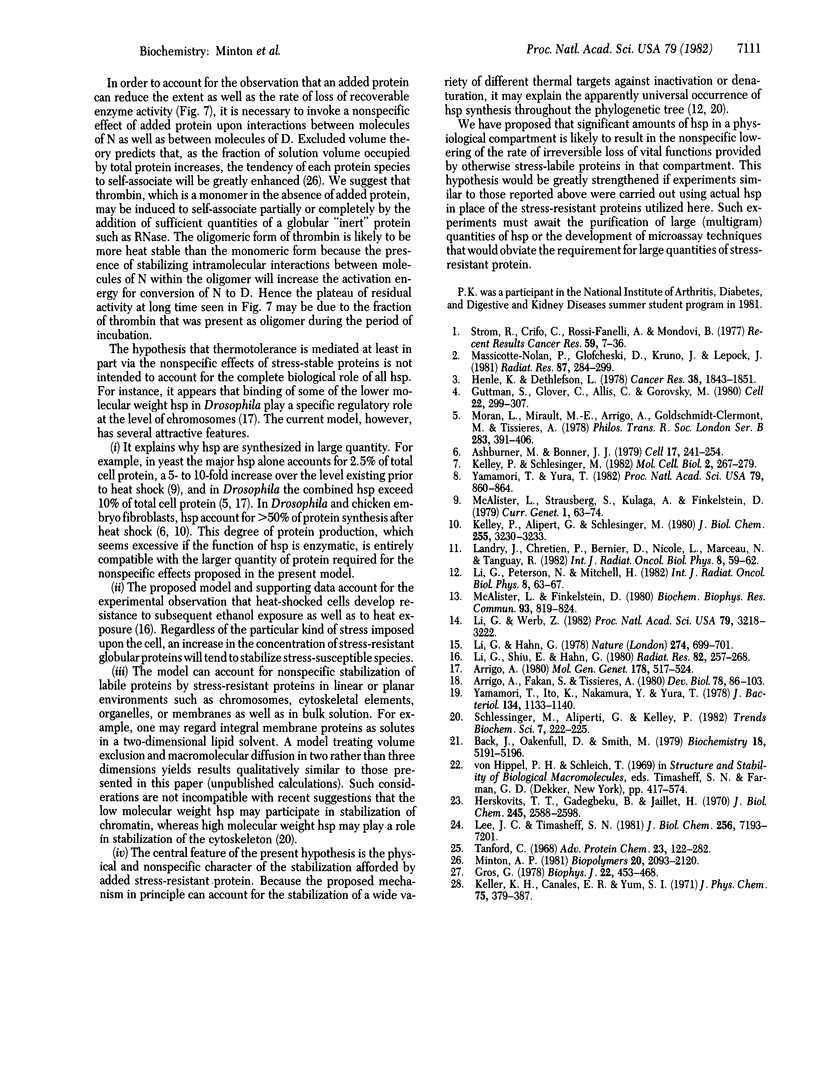Abstract
It is demonstrated experimentally that addition of proteins that are themselves resistant to denaturation by heat or ethanol can nonspecifically stabilize other proteins that are ordinarily highly susceptible to inactivation. It is proposed that the diffusion-limited rate with which unfolded protein molecules encounter each other and become irreversibly crosslinked is reduced in the presence of substantial concentrations of an unreactive globular protein. We suggest that one of the functions of heat shock proteins, which are synthesized in large amounts after exposure of cells to increased temperature and other forms of stress, may be to stabilize other proteins kinetically in a similarly nonspecific fashion.
Full text
PDF




Selected References
These references are in PubMed. This may not be the complete list of references from this article.
- Arrigo A. P., Fakan S., Tissières A. Localization of the heat shock-induced proteins in Drosophila melanogaster tissue culture cells. Dev Biol. 1980 Jul;78(1):86–103. doi: 10.1016/0012-1606(80)90320-6. [DOI] [PubMed] [Google Scholar]
- Arrigo A. P. Investigation of the function of the heat shock proteins in Drosophila melanogaster tissue culture cells. Mol Gen Genet. 1980;178(3):517–524. doi: 10.1007/BF00337856. [DOI] [PubMed] [Google Scholar]
- Ashburner M., Bonner J. J. The induction of gene activity in drosophilia by heat shock. Cell. 1979 Jun;17(2):241–254. doi: 10.1016/0092-8674(79)90150-8. [DOI] [PubMed] [Google Scholar]
- Back J. F., Oakenfull D., Smith M. B. Increased thermal stability of proteins in the presence of sugars and polyols. Biochemistry. 1979 Nov 13;18(23):5191–5196. doi: 10.1021/bi00590a025. [DOI] [PubMed] [Google Scholar]
- Gros G. Concentration dependence of the self-diffusion of human and Lumbricus terrestris hemoglobin. Biophys J. 1978 Jun;22(3):453–468. doi: 10.1016/S0006-3495(78)85499-X. [DOI] [PMC free article] [PubMed] [Google Scholar]
- Guttman S. D., Glover C. V., Allis C. D., Gorovsky M. A. Heat shock, deciliation and release from anoxia induce the synthesis of the same set of polypeptides in starved T. pyriformis. Cell. 1980 Nov;22(1 Pt 1):299–307. doi: 10.1016/0092-8674(80)90177-4. [DOI] [PubMed] [Google Scholar]
- Henle K. J., Dethlefsen L. A. Heat fractionation and thermotolerance: a review. Cancer Res. 1978 Jul;38(7):1843–1851. [PubMed] [Google Scholar]
- Herskovits T. T., Gadegbeku B., Jaillet H. On the structural stability and solvent denaturation of proteins. I. Denaturation by the alcohols and glycols. J Biol Chem. 1970 May 25;245(10):2588–2598. [PubMed] [Google Scholar]
- Kelley P. M., Aliperti G., Schlesinger M. J. In vitro synthesis of heat-shock proteins by mRNAs from chicken embryo fibroblasts. J Biol Chem. 1980 Apr 25;255(8):3230–3233. [PubMed] [Google Scholar]
- Kelley P. M., Schlesinger M. J. Antibodies to two major chicken heat shock proteins cross-react with similar proteins in widely divergent species. Mol Cell Biol. 1982 Mar;2(3):267–274. doi: 10.1128/mcb.2.3.267. [DOI] [PMC free article] [PubMed] [Google Scholar]
- Landry J., Chrétien P., Bernier D., Nicole L. M., Marceau N., Tanguay R. M. Thermotolerance and heat shock proteins induced by hyperthermia in rat liver cells. Int J Radiat Oncol Biol Phys. 1982 Jan;8(1):59–62. doi: 10.1016/0360-3016(82)90385-6. [DOI] [PubMed] [Google Scholar]
- Lee J. C., Timasheff S. N. The stabilization of proteins by sucrose. J Biol Chem. 1981 Jul 25;256(14):7193–7201. [PubMed] [Google Scholar]
- Li G. C., Hahn G. M. Ethanol-induced tolerance to heat and to adriamycin. Nature. 1978 Aug 17;274(5672):699–701. doi: 10.1038/274699a0. [DOI] [PubMed] [Google Scholar]
- Li G. C., Petersen N. S., Mitchell H. K. Induced thermal tolerance and heat shock protein synthesis in Chinese hamster ovary cells. Int J Radiat Oncol Biol Phys. 1982 Jan;8(1):63–67. doi: 10.1016/0360-3016(82)90386-8. [DOI] [PubMed] [Google Scholar]
- Li G. C., Shiu E. C., Hahn G. M. Similarities in cellular inactivation by hyperthermia or by ethanol. Radiat Res. 1980 May;82(2):257–268. [PubMed] [Google Scholar]
- Li G. C., Werb Z. Correlation between synthesis of heat shock proteins and development of thermotolerance in Chinese hamster fibroblasts. Proc Natl Acad Sci U S A. 1982 May;79(10):3218–3222. doi: 10.1073/pnas.79.10.3218. [DOI] [PMC free article] [PubMed] [Google Scholar]
- Massicotte-Nolan P., Glofcheski D. J., Kruuv J., Lepock J. R. Relationship between hyperthermic cell killing and protein denaturation by alcohols. Radiat Res. 1981 Aug;87(2):284–299. [PubMed] [Google Scholar]
- McAlister L., Finkelstein D. B. Heat shock proteins and thermal resistance in yeast. Biochem Biophys Res Commun. 1980 Apr 14;93(3):819–824. doi: 10.1016/0006-291x(80)91150-x. [DOI] [PubMed] [Google Scholar]
- Moran L., Mirault M. E., Arrigo A. P., Goldschmidt-Clermont M., Tissières A. Heat shock of Drosophila melanogaster induces the synthesis of new messenger RNAs and proteins. Philos Trans R Soc Lond B Biol Sci. 1978 May 11;283(997):391–406. doi: 10.1098/rstb.1978.0044. [DOI] [PubMed] [Google Scholar]
- Strom R., Crifo C., Rossi-Fanelli A., Mondovi B. Biochemical aspects of heat sensitivity of tumour cells. Recent Results Cancer Res. 1977;(59):7–35. doi: 10.1007/978-3-642-81080-0_2. [DOI] [PubMed] [Google Scholar]
- Tanford C. Protein denaturation. Adv Protein Chem. 1968;23:121–282. doi: 10.1016/s0065-3233(08)60401-5. [DOI] [PubMed] [Google Scholar]
- Yamamori T., Ito K., Nakamura Y., Yura T. Transient regulation of protein synthesis in Escherichia coli upon shift-up of growth temperature. J Bacteriol. 1978 Jun;134(3):1133–1140. doi: 10.1128/jb.134.3.1133-1140.1978. [DOI] [PMC free article] [PubMed] [Google Scholar]
- Yamamori T., Yura T. Genetic control of heat-shock protein synthesis and its bearing on growth and thermal resistance in Escherichia coli K-12. Proc Natl Acad Sci U S A. 1982 Feb;79(3):860–864. doi: 10.1073/pnas.79.3.860. [DOI] [PMC free article] [PubMed] [Google Scholar]



